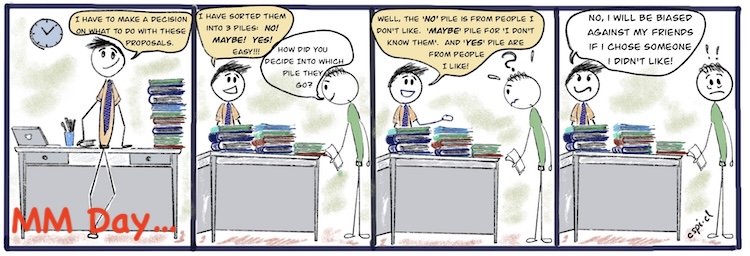
If I see food on the menu that I do not like eating my decision will be not to order it. A bias is more complicated but it’s also tendency to prefer something over another. We all have biases. As we go about our busy days our brain is constantly filtering the billions of inputs that are received by our five senses to let through what interest us. Over our lifetimes, unconsciously, we have made our brains aware of our preferences.
Some of our preferences might come from modelling our parents, siblings or others who have had an influence on us. What we call an influence is very often a set of ways of behaving or thinking. These in themselves can lead to developing biases.
In making decisions as a manager biases can play a role for better or for worse. Below are four selected biases that are common and suggest ways in how to avoid them causing ineffective decisions.
By the way, psychologists and behaviour economists have listed dozens of different biases and given them very descriptive names, so do not think that these are the only biases that we should be wary of.
Confirmation Bias
The first bias is confirmation bias. As the name implies this is a bias that leads you to listen to information that supports your own thinking, neglecting other perspectives. If you are a Taylor Swift fan and hear something detrimental about her, you will tend to see it as misinformation and continue being a fan. In business if you believe a particular tactic is the right one you might close your mind to alternatives. ‘Closing your mind’ is actually letting your mind know what to filter out. Your brain is constantly on the lookout to learn what interests you or doesn’t. You will become aware of this bias when you find you are restless or frustrated because another person is suggesting a different solution. In your mind you are likely saying “OK let’s move on already!”
The main way out of this situation is to ‘open’ your mind. Literally tell yourself that you are open to other ideas. Having an open mind can be supported by encouraging other views to be expressed and even asking others to argue against what you are biased towards. Both require acceptance that everyone has biases and so do you and you do not want a bias to block multiple ideas being considered.
Anchoring Bias
The second common bias is the anchoring bias. This is latching onto something, usually based on the first information you receive, and then ignoring further evidence. Think of a detective deciding early on that the ‘wife did it’. The detective then ignores or downplays any new evidence or stops seeking other suspects. In the end the wife might be charged, when in fact it was the gardener who committed the crime! In business, an example is a manager anchoring on the first proposal of a fee charge for a potential client by a salesperson. She then negotiates with the salesperson from that anchored position and might leave a lot of money on the table.
Excessive Optimism Bias
The third bias is excessive optimism. This is the tendency to overestimate the result of planned actions, the likelihood of positive events and ignore the possibility of negative events. To manage this bias similar to the actions for the confirmation bias, be open to other points of view and the reality of the situation. To be optimistic is good, however, the optimism should be geared to confidence in the energy and effort that will be put into achieving the goals. Coupled with this reality based optimism the manager must be open to seeing or hearing events that might constrain the goal being reached.
Listening to the story-teller
The fourth bias is listening to the storyteller. This is a tendency to remember and to accept more easily a set of facts when packaged in a coherent story. We all love stories. The whole movie industry and most of television are built on the fact that we get great enjoyment from listening to stories. It is also a fact that you will remember the two stories told during an hour long sermon, but will be hard-pressed to recall what was said in between the stories. All presentations to managers are attempts at telling a story to influence a decision or opinion. Managers can go against this bias by focussing on the facts presented and allowing additional facts and viewpoints to be considered. Many poor presentations are made to managers by people who are not skilled storytellers. The manager should look past the presentation skills to the hidden story that the presenter is trying to get across.
All people have biases. All people are unaware of most of them. We might be sitting in a coffee store sipping a coffee and watching people come in. Without conscious thought we will have opinions on each of them. These opinions or the logical outflow of the biases that we hold. It’s a general rule the following four behaviours will help us in making better decisions or arriving at better opinions.
- Acknowledge that you are made up of multiple biases. Be open to letting in and considering other viewpoints, opinions, facts and suggestions. Proactively invite such input.
- Find ways to encourage others to speak up, criticize, question or provide alternatives to what you believe to be right. You might go as far as inviting people to act as devils advocates. A devil’s advocate was a person appointed to argue against the canonization of a candidate for sainthood in the Catholic Church, by uncovering flaws or misrepresentation of evidence. Today it simply means someone who will argue against what has been proposed. Sometimes, in business, when an important decision has been made it is useful for an individual or a team to act as the devils advocate as a final check on the decisions to be made.
- Conduct blind reviews when appropriate. For example in hiring before HR endorses resumes to to you ask that leave out information on age, sex, name, race, marital status for example and judge the resumes based on are what they they have achieved to date and what skills they have demonstrated.
- If you have called for proposals from staff – have them hide the names of those preparing the proposal.
- Think. This means ponder questions. In hiring make a clear list of the capabilities the role needs and use those as a guide. If there is some peer pressure to follow a particular path ask “what other choices are there, is this the best choice?’. Ask ‘Do we have enough information?’. Ask “Why I am so keen on this solution vs others?” And so on. Management thinking is always driven by a question. One of the powerful question that leads to innovation more often than not is “what if….?” What if all car owners could also be taxi operators? “What if a phone could also be an internet connection, music player and mini arcade?”
Final Thoughts
Practice spying on your biases! In that coffee shop when you see someone ask yourself – “why do I think they are a loser?” or “Why do I think that would be a great person to get to know?” In work when you feel strongly for some decision or solution or the opposite when you feel strongly against it ask “Why do I feel so strongly about this?
By practicing in the moment you will become more aware of the biases that you have.
I grew up in South Africa during the apartheid period. I thought that the treatment of black South Africans was horrendous. One day talking to a friend, discussing apartheid and what could be done to change things, he asked me “What do you think of Blacks?”. I had never really thought about it deeply. As I did I became aware of biases that I had. For a week afterwards I actual wrote down the answers to the question: ”What do I think of Blacks in South Africa?”. The biases I had surprised me and led me to be aware of so many hidden biases that existed in me. But with awareness came the opportunity to question their veracity and not let them retain power over my thoughts, decisions and actions. Living in the Philippines and travelling to various countries in Asia you realize that we, likely, all have preconceived ideas (biases) about each nation and their people – Chinese, Indian, Thai, Vietnamese, Singaporeans, Qatari, Saudis, Indonesians….wow the list goes on and we each have our own biases. What we owe ourselves is to be aware of them and not let them lead us into making wrong decisions or acting in inappropriate ways.

